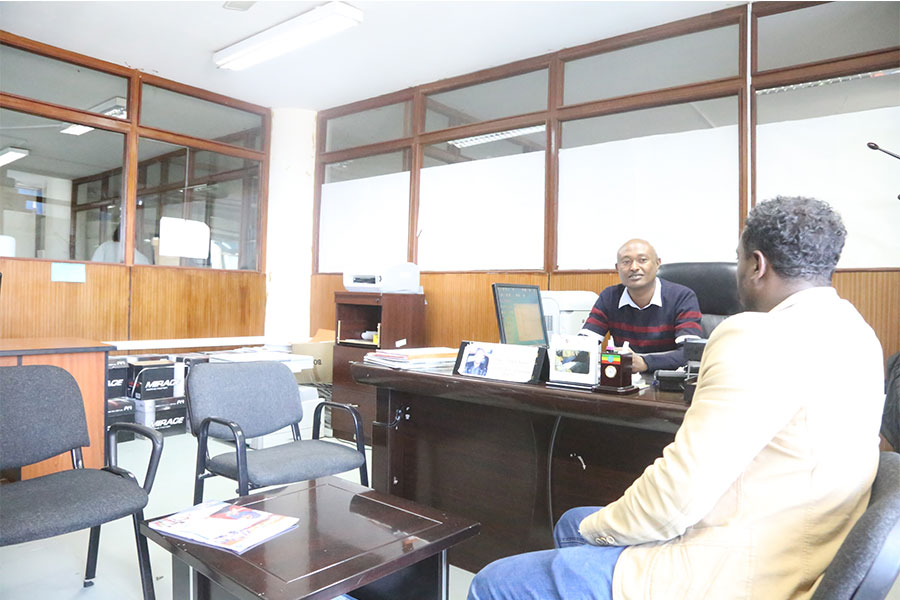
A regulation, which will form a 10-member national council that will put forward policy interventions to solve the bottlenecks in the logistics industry, has reached the final stage before it becomes law.
Drafted by the Maritime Affairs Authority, the bill is tabled to the Council of Ministers for a final vote. If passed, the National Logistics Transformation Council will be formed as an autonomous entity that will operate under the Office of the Prime Minister, and will have members from the ministries of Revenue, Transport, Finance and Trade & Industries, the National Bank of Ethiopia and the Ethiopian Freight Forwarders & Shipping Association.
The Council will be in charge of making high-level policy decisions, according to Mekonnen Abera, director-general of the Maritime Affairs Authority. It was proposed to be an ad hoc committee, but the Authority held out for the establishment of a Council, according to him.
"Unlike other councils and committees, it will be a legal entity to ensure accountability," Mekonnen told Fortune.
The formation of the Council is part of the current intervention from the government to solve the problems in the logistics sector. With the hope of alleviating the loopholes in the industry and pushing the sector forward, the government has drafted a 10-year national logistics document that has six strategies, 22 sub-strategies and 98 interventions.
Ethiopia has been identified as one of the countries that has poor logistics practices and lacks coordination of goods transport. Its ranking on the logistics performance index of the World Bank went three levels back last year to the 131st position. With the current logistics system, average shipments may take four months to reach their end destination.
The inefficiency of the logistics sector knocks on the door of every citizen, according to Dagmawit Moges, minister of Transport, who opened a meeting that was held at the Office of the Prime Minister focused on the ongoing reforms in the logistics sector.
"It has an effect on consumer products," she said.
The logistics industry is monopolised by the state giant Ethiopian Shipping & Logistics Services Enterprise, which ferries import and export commodities of the country to and from 327 ports.
Due to the inefficiency of the industry, Ethiopia had been paying 20,000 dollars to 25,000 dollars a day in foreign currency as a demurrage cost.
"The previous logistics system has been considering ships and trucks as warehouses," said Mekonnen.
The strategy has identified all the challenges in the industry and proposed various solutions, according to Mekonnen.
"We wish the Council was formed yesterday," said Elisabeth Getahun, CEO of Panafric Global and president of the Ethiopian Freight Forwarders & Shipping Agents Association, explaining the sector has been suffering for years. "And once the initiative is started, it should be fast."
Better than before, the government paid due attention to the logistics sector, according to Mamo Mihretu, a senior advisor to the Prime Minister and Ethiopia's chief negotiator.
It is one of the pillars mentioned in the Homegrown Economic Reform Agenda, since it is relevant to every sector and is a factor of growth by itself, according to Mamo.
Under the structural reform to create a conducive investment climate, the government plans to reform the logistics sector along with power and telecommunications.
The government is working on three areas to reform the sector, according to Mamo. Engaging with infrastructure development, involving private operators and working on regulations are the focus areas.
With the ongoing reforms, the government wishes to improve the logistics performance index ranking of Ethiopia to 40th. It also intends to make it the leading country in East Africa and cut the four-month duration an import takes to be delivered to 40 days.
The establishment of the Council alone cannot make the country achieve this target, according to Dagmawit.
"Since it is high-level, the Council would not actively engage with the day-to-day activities in the industry," she said. "Stakeholder institutions should coordinate and plan together to effectively work on the ground work."
Matiwos Ensermu (PhD), a lecturer at the Addis Abeba University specialising in logistics and supply chain management, says that the government should think of a fast and shortcut mechanism to improve the country's ranking.
"Since the leading countries will also keep growing," said Matiwos, "the country can't reach their level moving at the current pace."
Matiwos recommends that the government work on human capacity development, work on the value chain, improve local logistics, advance technology and focus on making Addis Abeba a logistics city.
"Most importantly, the country should jump into third and fourth party logistics as well as virtual logistics," he said.
PUBLISHED ON
Mar 07,2020 [ VOL
20 , NO
1036]

Editorial | Nov 21,2018

Radar | Sep 27,2020

Radar | Aug 20,2022

Agenda | Dec 25,2018

Fortune News | Dec 04,2022

Dec 22 , 2024 . By TIZITA SHEWAFERAW
Charged with transforming colossal state-owned enterprises into modern and competitiv...

Aug 18 , 2024 . By AKSAH ITALO
Although predictable Yonas Zerihun's job in the ride-hailing service is not immune to...

Jul 28 , 2024 . By TIZITA SHEWAFERAW
Unhabitual, perhaps too many, Samuel Gebreyohannes, 38, used to occasionally enjoy a couple of beers at breakfast. However, he recently swit...

Jul 13 , 2024 . By AKSAH ITALO
Investors who rely on tractors, trucks, and field vehicles for commuting, transporting commodities, and f...

Jun 28 , 2025
Meseret Damtie, the assertive auditor general, has never been shy about naming names...

Jun 21 , 2025
A well-worn adage says, “Budget is not destiny, but it is direction.” Examining t...

Jun 14 , 2025
Yet again, the Horn of Africa is bracing for trouble. A region already frayed by wars...

Jun 7 , 2025
Few promises shine brighter in Addis Abeba than the pledge of a roof for every family...